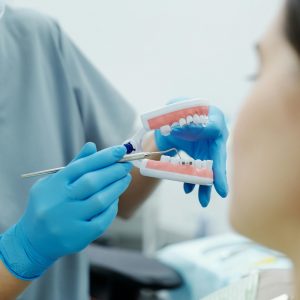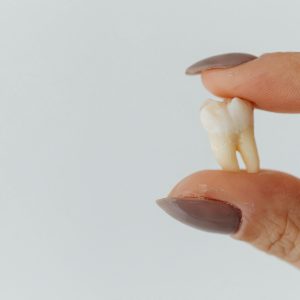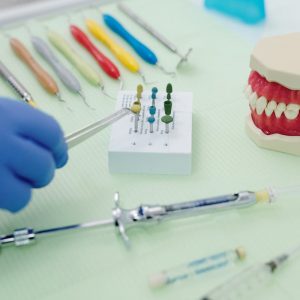Temporomandibular Joint (TMJ) disorders can significantly impact a person’s quality of life, causing pain and discomfort in the jaw area. Fortunately, a dentist specializing in TMJ can diagnose, treat, and manage these disorders with precision and care. This article will guide you through the entire journey of TMJ evaluation and treatment, highlighting what to expect, how to prepare, and the range of treatment options available, including dental implants, dentures, and more.
What to Expect During Your TMJ Evaluation with a Specialist

When visiting a dentist specializing in TMJ, comprehensive evaluations are conducted to identify the root cause of TMJ disorder. During the initial assessment, the dentist will perform a detailed examination of your jaw, facial muscles, and joint function to determine the severity of the condition. This process often includes imaging tests such as X-rays, MRIs, or CT scans to provide a clear view of the bone structure and joint alignment.
A dentist specializing in TMJ will also inquire about your medical history, lifestyle, and any previous treatments you may have undergone. This holistic approach ensures that they develop an accurate diagnosis and effective treatment plan. Patient education is another critical aspect of the evaluation, where dentists provide information about TMJ, potential triggers, and lifestyle modifications to reduce symptoms and improve well-being.
The entire evaluation process is designed to be comfortable and informative. A skilled dentist specializing in TMJ will ensure that you fully understand the condition and potential treatment paths. By the end of the evaluation, you’ll have a clearer understanding of your condition and feel more confident in the choices available for managing your TMJ disorder.
Preparing for Your First Visit: Questions to Ask a Dentist Specializing in TMJ

As you prepare for your first visit to a dentist specializing in TMJ, compiling a list of relevant questions can help maximize the value of your appointment. Consider asking about the dentist’s experience with TMJ disorders and their approach to treatment. It’s essential to understand the methodologies and techniques utilized in their practice, such as whether they incorporate acupuncture treatment or work closely with chiropractic services.
Inquire about the range of treatments they offer, including whether they provide or recommend dental implants and dentures as part of TMJ management. Understanding the full spectrum of treatment options can enable you to make informed decisions about your care. It’s also beneficial to ask about the estimated timeline and expected outcomes of various treatments to set realistic expectations.
Finally, discuss how they coordinate with emergency dentists for urgent TMJ-related issues. It’s reassuring to know you have a plan in place if the need for immediate care arises. Being proactive in asking questions will empower you and help create a collaborative patient-dentist relationship.
How a Dentist Specializing in TMJ Works with Emergency Dentists for Urgent Care

TMJ disorders can occasionally manifest in acute, painful flare-ups requiring urgent care. In such cases, a dentist specializing in TMJ collaborates with emergency dentists to provide timely relief. Coordination between these professionals ensures that you receive the appropriate care when unexpected symptoms occur.
This collaboration typically involves the emergency dentist offering initial pain relief and stabilization for the patient. They then communicate with the TMJ specialist to provide insights into the situation and any immediate interventions administered. The dentist specializing in TMJ will use this information to adjust or supplement your personalized treatment plan.
Having a predefined plan for handling emergencies can significantly reduce anxiety for TMJ patients. Knowing that your dentist specializing in TMJ is prepared to work with emergency dentists clarifies the process for receiving effective care in urgent situations. This robust network of dental professionals aims to ensure continual patient care and facilitate long-term recovery.
How TMJ Specialists Craft Personalized Treatment Plans for Lasting Relief

Creating a personalized treatment plan is a hallmark of a dentist specializing in TMJ. After evaluating the patient’s unique needs, the specialist designs a treatment regimen tailored to address the underlying causes of the disorder. This often includes a mix of therapies such as exercises, medication, and the use of dental appliances like splints or mouthguards.
Over time, the dentist may adjust the plan based on the patient’s progress and any new developments in their condition. This dynamic approach allows for flexibility in treatment, ensuring that care evolves with the patient’s healing process. The ultimate goal of these personalized plans is to provide lasting relief and to improve the patient’s quality of life.
A successful treatment plan typically integrates complementary therapies like acupuncture treatment or chiropractic service when appropriate. By considering the entire body’s health, a dentist specializing in TMJ works to reduce stress and tension, further supporting joint health and functionality. This holistic strategy underscores the importance of individualized care in managing TMJ disorders.
The Role of Dental Implants in Restoring Balance for TMJ Patients
Dental implants can play a crucial role in the treatment plans crafted by a dentist specializing in TMJ. When TMJ disorders are aggravated by the misalignment of teeth or missing teeth, dental implants offer a stable solution. They provide the necessary support and balance to the jaw, which can facilitate improved TMJ function and reduce symptoms.
The process of integrating dental implants into a TMJ treatment plan involves a thorough analysis of the patient’s dental structure. A dentist specializing in TMJ will assess whether implants can correct bite issues contributing to joint strain. When appropriately utilized, dental implants can restore normalcy in eating, speaking, and overall jaw function.
However, not all TMJ patients are candidates for dental implants. The dentist will consider bone density and the overall health of the jaw before recommending implants. Nonetheless, for those suitable candidates, this surgical intervention can significantly enhance the efficacy of TMJ treatment and contribute to long-term relief.
How Dentures Can Impact Jaw Health and TMJ Functionality
Dentures are another dental solution that can impact TMJ health, especially if they are poorly fitted. A dentist specializing in TMJ examines how the fit and alignment of dentures may be affecting the jaw joint. In cases where dentures exacerbate TMJ symptoms, adjustments or alternative solutions may be recommended.
The proper fitting of dentures is essential for maintaining balance in the jaw and preventing excessive strain on the TMJ. A dentist specializing in TMJ may suggest specific modifications to the dentures to alleviate pressure and enhance comfort. Regular follow-ups ensure that dentures continue fitting well, thereby supporting optimal jaw functionality.
Additionally, patients who require dentures as part of their treatment plan can work collaboratively with their dentist to ensure their needs are met. This collaborative effort ensures that the prosthetics serve to enhance the alignment and stability of the jaw, thus aiding in the management of TMJ disorders.
Addressing Sleep Apnea-Related TMJ
Sleep apnea and TMJ disorders often present together, and addressing both conditions can significantly improve a patient’s quality of life. A dentist specializing in TMJ may recognize how the two are interconnected, potentially recommending a multidisciplinary approach involving a sleep specialist. Management might include the use of a CPAP machine in tandem with TMJ-specific treatments.
The CPAP machine, or continuous positive airway pressure device, helps maintain open airways during sleep, reducing the instances of apneic episodes. By treating sleep apnea with such devices, there may be a corresponding decrease in TMJ-related pain caused by nighttime clenching or grinding. This multifaceted approach aims to alleviate symptoms through both airway management and targeted TMJ therapies.
Ultimately, a dentist specializing in TMJ can collaborate with sleep specialists to create a cohesive plan that addresses both conditions. With proper treatment, TMJ patients can experience improved sleep quality and reduced daytime symptoms, fostering better overall health and well-being.
Exploring PRP Treatment for TMJ Pain and Jaw Joint Healing
PRP treatment, or platelet-rich plasma therapy, is an emerging intervention in the management of TMJ disorders. This regenerative approach involves utilizing the patient’s own blood components to promote healing and reduce inflammation in the jaw joint. A dentist specializing in TMJ may consider PRP treatment for patients who do not respond well to conventional therapies.
The process involves extracting blood, processing it to concentrate platelets, and then injecting it into the damaged area. This stimulates the body’s natural healing processes, potentially resulting in reduced pain and improved joint function. For many patients, this innovative treatment helps alleviate chronic pain and accelerates recovery times.
While not universally recommended for all TMJ patients, PRP treatment represents a promising option for those seeking alternatives to traditional approaches. Patients should discuss the potential benefits and risks with their dentist specializing in TMJ to determine if they are suitable candidates for this therapy.
What Treatments Can Support Your TMJ Recovery Plan?
Beyond conventional treatments, a range of supplementary therapies can support the recovery plan crafted by a dentist specializing in TMJ. Chiropractic service, for example, can be effective in alleviating tension and aligning the musculoskeletal system. Regular visits to a chiropractor office may help in maintaining posture and reducing stress on the jaw joint.
Acupuncture treatment is another complementary therapy that might be integrated into TMJ management. By targeting specific pressure points, acupuncture can relieve pain and reduce stress levels, thus enhancing the efficacy of other treatments. These non-invasive methods provide holistic options for patients seeking comprehensive care.
Local counseling services specializing in stress management can also play a crucial role in TMJ recovery. By addressing underlying stressors and developing coping strategies, patients can reduce the likelihood of exacerbating TMJ symptoms. Together with the intervention of a dentist specializing in TMJ, these practices contribute to a well-rounded approach to health and healing.
Hormone Treatments and Their Connection to TMJ Pain Management
The role of local hormone treatments in TMJ pain management is an area of growing interest. Hormonal imbalances can influence pain perception and muscle tension, potentially aggravating TMJ symptoms. A dentist specializing in TMJ may work with endocrinologists to devise appropriate hormone treatments that address these imbalances.
For some female patients, fluctuations in hormone levels during menstruation, pregnancy, or menopause can exacerbate TMJ disorders. Identifying such patterns is crucial for tailoring treatment strategies that account for these hormonal influences. By incorporating local hormone treatments, patients may experience improved symptom control and relief.
Although hormone treatment is not a standalone solution for TMJ disorders, it can form an integral part of a broader management plan. Patients should have open discussions with their healthcare providers, including their dentist specializing in TMJ, to explore whether hormone therapy may be beneficial for them.
The Link Between Stress and TMJ Disorders
Stress is a well-known contributor to TMJ disorders, with many patients experiencing heightened symptoms during periods of increased anxiety or tension. A dentist specializing in TMJ often considers the psychological factors influencing physical health as part of a comprehensive treatment approach. Stress-relief techniques can be recommended alongside traditional TMJ therapies.
Local counseling services can provide valuable support in managing stress, equipping patients with tools to reduce their mental burden. Techniques such as mindfulness, relaxation exercises, and cognitive-behavioral therapy can alleviate stress-related TMJ discomfort. A collaborative approach that incorporates psychological care can significantly enhance treatment outcomes.
The connection between stress and TMJ underscores the importance of addressing mental health alongside physical symptoms. By working with a dentist specializing in TMJ and mental health professionals, patients have the opportunity to tackle both aspects of their condition, leading to improved overall well-being and improved management of TMJ disorders.
TMJ disorders require a nuanced, multifaceted approach for effective management and relief. A dentist specializing in TMJ can provide a thorough evaluation and devise personalized treatment plans that may include a combination of dental implants, PRP treatment, and other complementary methods. By collaborating with other health professionals such as emergency dentists, chiropractors, and sleep specialists, these dentists offer comprehensive care addressing all facets of the disorder.
Whether considering dental implants, dentures, acupuncture treatment, or hormone therapy, it’s vital to remain informed and engaged in the treatment process. This guide has provided a detailed overview of the available options and considerations for managing TMJ disorders. With the right resources and support, TMJ patients can achieve significant improvements in their quality of life.
In conclusion, a proactive, informed approach to managing TMJ disorders is key. By working closely with a dentist specializing in TMJ and utilizing the wide range of available treatments, patients can find lasting relief from TMJ symptoms. Remember to prioritize ongoing communication and adjustments to your treatment plan to ensure the best possible outcomes.





